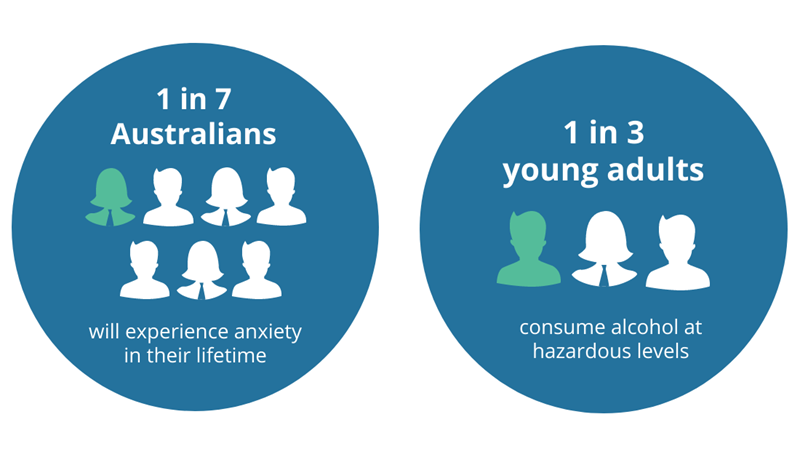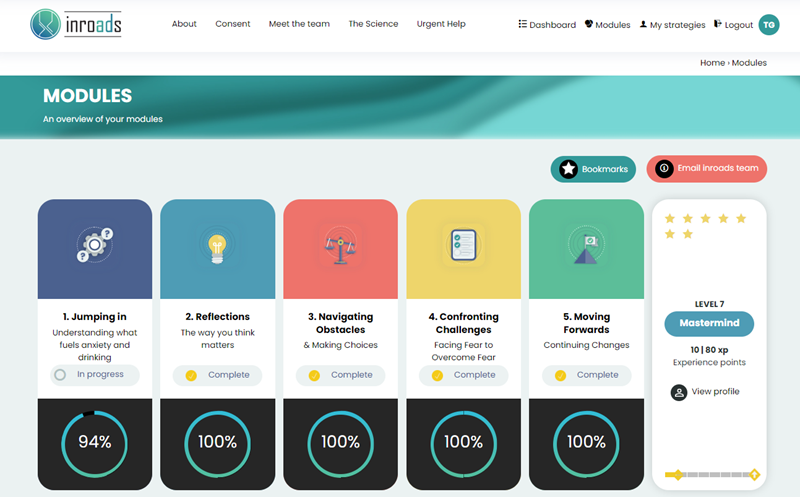What is the link between anxiety and drinking?
Anxiety and alcohol use disorders are among the most common mental health disorders. The transition out of secondary school and into young adulthood is a time of significant change for young people. The opportunities and challenges young people experience at this time include:
The transition out of secondary school and into young adulthood is a time of significant change for young people. The opportunities and challenges young people experience at this time include:
- Starting a new job or study program
- Establishing new friendships
- Experiencing new living situations e.g., moving out of home
For some young people, navigating these challenges can be associated with significant anxiety. It is common for anxiety symptoms to first emerge during the adolescent to early adulthood period. Young adulthood is also associated with increased access to and availability of alcohol, with almost one in three young adults consuming alcohol at hazardous levels. Alcohol is widely considered a relaxant and social lubricant, and using alcohol to reduce or cope with anxiety is commonly reported by young people. Research has confirmed the link between anxiety and drinking, finding that young people who experience anxiety symptoms are at increased risk of harmful alcohol use.
The COVID-19 pandemic and associated health, economic, and social consequences have seen a further increase in rates of anxiety and alcohol use. The pandemic brought uncertainty and stress into the lives of many Australians, and many young people reported their anxiety had gotten ‘a lot worse’. Compared to before the pandemic, 70% of people reported drinking alcohol more than usual. This increase was strongly associated with stress and drinking to cope with these feelings.
Over time, using alcohol to cope with anxiety leads to more drinking and makes anxiety symptoms worse. If not addressed, this vicious cycle between anxiety and alcohol can lead to long-term problems (e.g., health, study, work, relationships) for the young person.
The Inroads program: helping young people aged 17-30 yearsThe Inroads program is an online early intervention that empowers young people to manage anxiety and keep alcohol use within safe limits through the development of cognitive behavioural therapy (CBT) coping strategies. It is the first youth-focused program that targets:
Registrations for the Inroads program are currently closed. For more information or to register to be notified when the program becomes available, visit inroads.org.au/register.
The 5 Inroads modules

Are we making Inroads?A recent study evaluated the effectiveness of the Inroads program among young Australians. A total of 123 participants were randomly assigned to two groups. One group received the Inroads program combined with psychologist phone/email support. The second group received an online information booklet about alcohol and safe drinking recommendations.
The study found that the Inroads program had significant benefits compared with providing alcohol information. For up to 6 months after receiving the Inroads program, young people reported:
- Reduced hazardous alcohol use
- Reduced binge-drinking
- Reduced general anxiety symptoms
- Reduced social anxiety symptoms
Inroads has great potential to help young people cope with anxiety symptoms and keep their alcohol use under control. The online format is especially appealing to young people. A recent survey found that young people feel empowered, confident, in control, and less concerned about privacy when accessing help via the internet.
Read more about the research and evidence behind the Inroads program here.
What are the signs to look out for?Signs of anxiety may include:
- Fear of embarrassment, looking stupid, or being the centre of attention
- Feeling persistently anxious, stressed, tense or on edge
- Worrying a lot or feeling unable to stop or control worrying
- Feeling overwhelmed by physical sensations such as racing heart, dizziness or shortness of breath
If you or someone you know needs urgent help, find out more about support and crisis services here. A few organisations are listed below if you need immediate assistance:
The Inroads program was developed and piloted with funding from the Society for Mental Health Research, Australian Rotary Health, and The Department of Health and Aged Care.